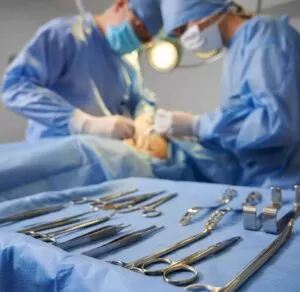Outline for the Article: Surgical Instruments for Specific Surgical Procedures

-
Introduction
- Briefly introduce the topic of surgical instruments and their significance in various medical procedures.
-
The Role of Precision
- Discuss the critical role of precision in surgical instruments and its impact on patient outcomes.
-
Common Types of Surgical Instruments
- Explain the various types of surgical instruments, from scalpels to forceps, and their unique purposes.
-
Specific Surgical Procedures
- Explore how different surgical instruments are tailored to specific medical procedures.
-
Instruments for Orthopedic Surgery
- Discuss the instruments used in orthopedic surgeries, such as bone saws, drills, and plates.
-
Ophthalmic Surgical Instruments
- Explain the specialized instruments required for eye surgeries, including microsurgical forceps and ophthalmic scissors.
-
Neurosurgery Instrumentation
- Highlight the precision instruments necessary for delicate neurosurgical procedures, like microdissection forceps and cranial drills.
-
Instruments in Cardiovascular Surgery
- Discuss the instruments used in heart surgeries, such as cardiac scissors, clamps, and sternal saws.
-
Gynecological and Obstetric Instruments
- Explore the instruments utilized in gynecological and obstetric procedures, including speculums and uterine forceps.
-
Instruments for Plastic Surgery
- Describe the specialized instruments used in plastic surgery, such as liposuction cannulas and tissue forceps.
-
Urological Surgical Instruments
- Discuss instruments tailored for urological procedures, including urethral dilators and kidney stone forceps.
-
Minimally Invasive Surgery Instruments
- Explain the tools used in minimally invasive surgeries, such as laparoscopic scissors and trocars.
-
The Advancements in Surgical Instruments
- Explore modern technological innovations and materials in the world of surgical instruments.
-
Quality Control and Sterilization
- Emphasize the importance of maintaining the quality and sterility of surgical instruments.
-
The Human Touch in Surgery
- Discuss how the surgeon’s expertise and skill complement advanced surgical instruments.
Surgical Instruments for Specific Surgical Procedures
Surgical procedures vary greatly, and so do the instruments required for their successful completion. From orthopedic surgeries to ophthalmic procedures, each medical field demands a distinct set of tools to achieve precise and effective results.
The Role of Precision
In the world of surgery, precision is non-negotiable. The accuracy of surgical instruments can make all the difference in patient outcomes. From making a clean incision to delicately maneuvering inside a patient’s body, precision is the cornerstone of surgical success.
Common Types of Surgical Instruments
Surgical instruments encompass a wide range of tools. Some of the most common ones include:
Scalpels
These precision cutting tools are essential in almost every surgical procedure, allowing surgeons to make precise incisions.
Forceps
Forceps come in various shapes and sizes and are used for grasping and holding tissues or objects during surgery.
Scissors
From dissecting scissors to tissue scissors, this category covers a broad spectrum of cutting instruments.
Clamps
Clamps are used to control bleeding, grasp tissues, or secure other instruments in place.
Specific Surgical Procedures
Let’s delve into the instruments used in specific surgical procedures:
Instruments for Orthopedic Surgery
Orthopedic procedures, which focus on the musculoskeletal system, require instruments like bone saws, drills, and plates to repair fractures and alleviate joint pain.
Ophthalmic Surgical Instruments
Ophthalmic surgery demands precision instruments, including microsurgical forceps and ophthalmic scissors for delicate eye procedures.
Neurosurgery Instrumentation
Neurosurgery is highly intricate, necessitating precision instruments like microdissection forceps and cranial drills for procedures involving the brain and nervous system.
Instruments in Cardiovascular Surgery
Cardiovascular surgeries, involving the heart and blood vessels, require instruments such as cardiac scissors, clamps, and sternal saws for intricate procedures.
Gynecological and Obstetric Instruments
Gynecological and obstetric surgeries involve specialized instruments like speculums, uterine forceps, and suction devices for women’s health and childbirth procedures.
Instruments for Plastic Surgery
Plastic surgeons rely on specific tools such as liposuction cannulas and tissue forceps to enhance appearance and function.
Urological Surgical Instruments
Urological surgeries use instruments like urethral dilators and kidney stone forceps to treat urinary tract and reproductive system conditions.
Minimally Invasive Surgery Instruments
Minimally invasive surgeries, known for smaller incisions and shorter recovery times, rely on instruments like laparoscopic scissors and trocars for enhanced precision.
The Advancements in Surgical Instruments
The field of surgical instruments continues to evolve. Modern innovations include the use of robotic-assisted surgical systems, advanced materials, and 3D printing for custom tools tailored to each patient’s needs.
Quality Control and Sterilization
The safety of patients and the effectiveness of surgical instruments depend on stringent quality control and sterilization protocols. Following manufacturer guidelines for maintenance and adhering to industry standards for sterilization is crucial.
The Human Touch in Surgery
While surgical instruments have become increasingly sophisticated, the skill and expertise of the surgeon remain irreplaceable. The human touch in surgery, combined with advanced tools, ensures the best possible outcomes for patients.
Conclusion
Surgical instruments are the backbone of modern medicine, allowing surgeons to perform intricate procedures with precision and care. From orthopedics to urology, each medical field has its unique requirements for instruments. By prioritizing precision, quality control, and the human touch in surgery, healthcare professionals ensure the best outcomes for their patients.
FAQs (Frequently Asked Questions)
- Are surgical instruments standardized across all hospitals?
- While there are industry standards, hospitals may have slight variations in their instrument preferences.
- How often should surgical instruments be sterilized?
- Surgical instruments should be sterilized before each use, following specific guidelines.
- Do surgical instruments ever get recycled or reused?
- Some instruments can be sterilized and reused, while others are designed for single use.
- Are robotic surgical systems replacing traditional surgical instruments?
- Robotic systems are becoming more common but are used in conjunction with traditional instruments, not as replacements.
- What is the most challenging surgical field in terms of instrument precision?
- Neurosurgery is often considered the most challenging field due to the extreme precision required in delicate brain and nervous system procedures.

